Liver Cancer in Dogs: Signs, Symptoms & Causes
What Is Liver Cancer in Dogs?
A diagnosis of canine liver cancer is scary but there is hope and there is help - even if the tumor has grown to a substantial size. According to PetCure Oncolocy, liver cancer is rare, occurring in around 1% of dogs.
A liver tumor can be due to a condition called hepatocellular carcinoma (HCC). In other cases, a metastasis of cancer spread from another part of your dog's body can cause cancer to form in the liver.
While uncommon, liver cancer does occur in dogs. The most effective conventional treatment for liver cancer is the surgical removal of the tumor, depending upon the location of the tumor and the overall health of the dog. Dogs can often survive for years* after the surgical removal (or even partial surgical removal) of a primary liver cancer tumor (hepatocellular carcinoma). Dogs with primary liver cancer can live substantially longer than dogs diagnosed with another form of cancer.
*Reference: Research study: Massive hepatocellular carcinoma in dogs. J Am Vet Med Assoc. 2004 Oct 15;225(8):1225-30. doi: 10.2460/javma.2004.225.1225. Julius M Liptak, William S Dernell, Eric Monnet, et.al.
Since the liver can regenerate new tissue, it is a type of cancer that can respond especially well to supplemental treatments for liver cancer, such as liver support supplements and diet changes. Whether your dog has surgery or not, supportive care using a healthy diet and healthy natural liver support supplements can improve the quality of life for your pet and, often, the quantity of time as well.
Symptoms and Signs of Liver Cancer in Dogs
Many dogs are asymptomatic in the early stages of the disease. Liver tumors grow slowly, which can give time to allow the tumor to be discovered. Dogs with liver cancer will often show slow deterioration in eating, energy and weight - signs that can often be misinterpreted as old age. An ultrasound or X-ray can identify the tumor (sometimes it can be felt by your veterinarian).
- Abdominal pain
- Lack of appetite
- Weakness
- Weight loss
- Mass in the abdomen
Types Of Canine Liver Cancer
The liver plays several very important roles in your dog's body. The organ detoxifies the blood, metabolizes energy, breaks down medications, and secretes bile acids that are essential for digestion. The liver is a large organ that is divided into six separate lobes.
Liver cancer in dogs can affect just one or multiple lobes of the liver. Liver masses may be benign, malignant, or the result of metastasis (spread) from cancer spread in another part of your dog's body.
Liver and biliary (bile-related) tumors are divided into four types: hepatocellular tumors, bile duct tumors, neuroendocrine tumors, and primary sarcomas. The most common type of primary liver cancer (cancer that originates from the liver) in dogs is hepatocellular carcinoma (HCC) and it is defined by the type of tumor that forms:
- Massive - A single large tumor
- Nodular - Several masses spread throughout the liver
- Diffuse - Cancer growths seen throughout the entire liver
- Hepatocellular adenoma - A non-cancerous (benign) tumor. Can be problematic if they rupture (burst) or if they create pressure on other internal organs
Most dogs with hepatocellular carcinoma have a massive tumor. While the name is not necessarily indicative of the size, some tumors can grow to the size of a football. These are slow-growing tumors and tend to be easier to remove than nodular or diffuse tumors. If an HCC tumor is not surgically removed, it can eventually metastasize to other parts of your dog's body.
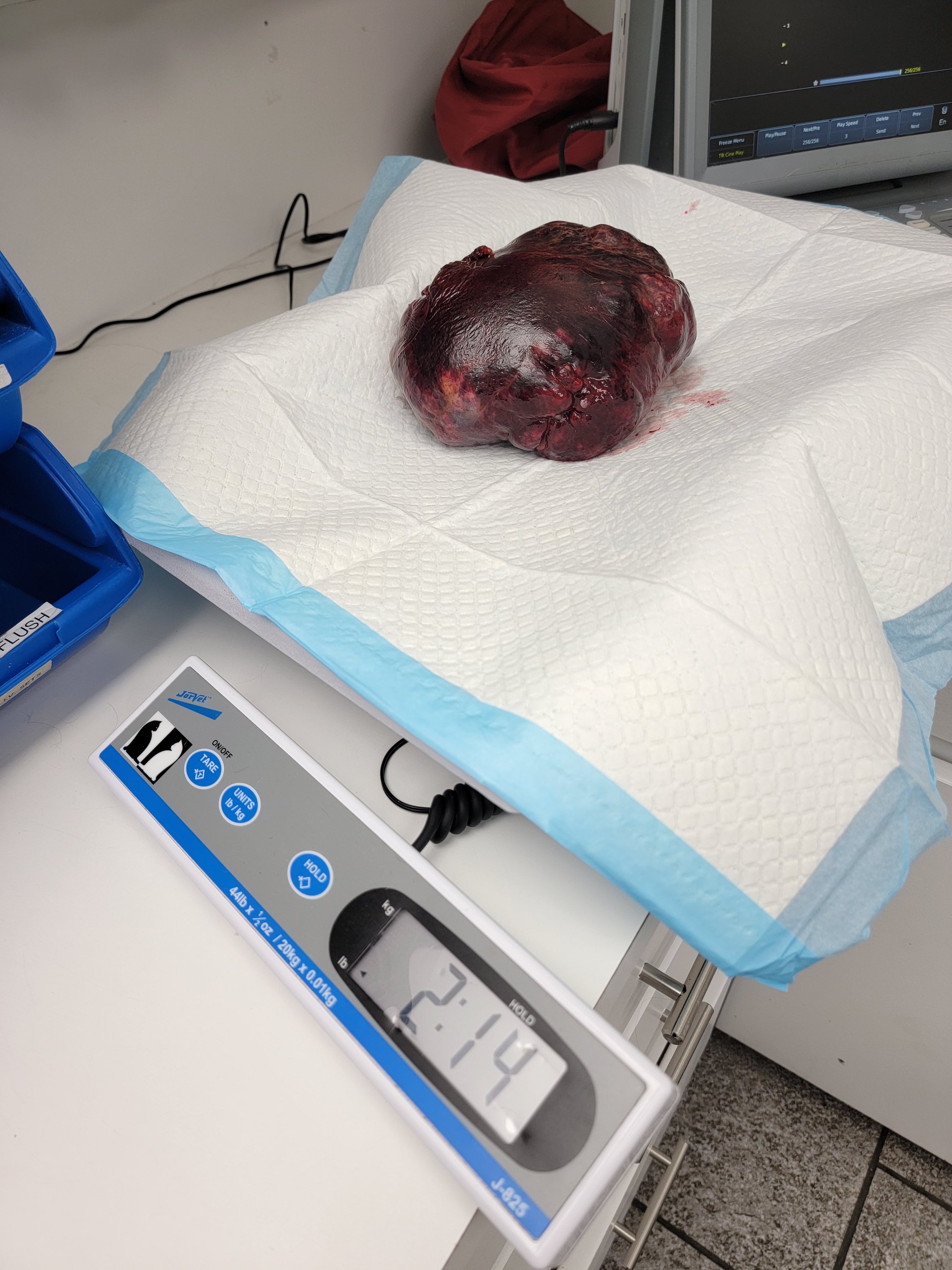 Massive hepatocellular tumors can be quite large.
Massive hepatocellular tumors can be quite large.
This is the tumor that was removed from Legend.
How Do Dogs Live With Liver Cancer?
No pet owner ever wants to hear the word cancer. It can make your heart sink. But, this diagnosis may not be as bad as it sounds.
A Canadian study regarding the long-term survival of dogs that undergo surgical treatment of liver tumors concludes that the prognosis associated with a liver tumor lobectomy is good [1].
A massive hepatocellular carcinoma is a very slow-growing tumor. In many cases, it has only attached to the liver tissue in a single liver lobe. These types of tumors can be resected with excellent margins. Even if a large portion of liver tissue is removed, the liver is the only organ in the body that can regenerate healthy tissue. Adding natural science-based supplements and feeding a liver-friendly diet can provide support for the repair and regeneration of liver tissue. By removing the affected parts of a dog’s liver, there is a chance of a full recovery.
When Surgery is An Option
The location of the tumor is probably the most important factor that your vet will consider when determining if surgery is an option. The liver is comprised of six lobes. Going from left to right, they are the left lateral, left medial, quadrate, right medial, right lateral and caudate lobes. Liver tumors on the left side of the organ are the easiest to remove. The right lobes of the liver are more vascular, so there is a greater risk of removing tumors located on that side. Tumors located near the portal vein are usually considered inoperable, as the portal vein is the main blood vessel running from the GI tract, pancreas and spleen to the liver. A computed tomography scan (CT scan) is the best way for your vet to determine the location of the tumor prior to surgery, however, it does require anesthesia. Sometimes surgery is performed following an ultrasound.
Survival Time for Post Liver Cancer Surgery
The average survival time for dogs that received surgery for hepatocellular carcinoma is about 3-5 years when complete surgical margins were achieved. While it was thought previously that there is a very low probability of recurrence [2], a more recent comprehensive research study [4] shows that recurrence is common regardless of margins. A debulking surgery, to remove even part of the tumors, is beneficial for dogs. Studies show that even dogs that had surgery with incomplete margins were still expected to survive for an additional 1-2 years [3]. Providing liver support in the form of supplements and the appropriate diet may help to extend the quality and quantity of time you have with your dog.
Surgery can be expensive and in many cases, it may be hard to determine from an x-ray or ultrasound what type of tumor your dog has and how much of the liver is affected. If you think that your dog may be a candidate for surgery, please discuss all possible risks and benefits with your veterinarian.
Best Diet for Dogs Diagnosed with Liver Cancer
Dogs diagnosed with cancer need a healthy diet that supports immune system and reduces inflammation.
However, dogs with liver cancer often need reduced amounts of fats and protein to take the workload off the liver.
Can Dog Liver Cancer Come Back?
The rate of liver cancer recurrence in dogs is less likely than recurrence with other types of cancer, but it can come back.
According to the above-referenced study published in Veterinary and Comparative Oncology, the median time for a new liver cancer tumor to recur was 367 days (range 32 - 2096 days). There was no significant difference in overall survival time for dogs regardless of the surgical margins.
If your dog has been treated for liver cancer, it is very important to routinely monitor your dog for the possibility of recurrence.
What If Your Dog's Liver Cancer Is Inoperable?
It can be very discouraging to hear that a tumor is inoperable. Dogs with tumors located near the portal vein or with diffuse liver cancer are generally not good candidates for surgery.
But, there are other treatment options to consider that can give you more quality time with your dog. What can you do if your dog's liver cancer is inoperable? There is exciting research and clinical trials that will hopefully soon transfer into standard procedures offered at veterinary oncologist offices.
- Get a second opinion - We want our pets to have the best care possible. With our own health, we often seek out a second opinion when diagnosed with serious health issues. You can do the same for your dog. The American Holistic Veterinary Medical Association has an online directory of holistic vets in the United States. Or, check with your current vet to get a referral to a veterinary oncologist.
- Feed a low-fat diet and use liver support supplements - Pets with cancer need a special diet that supports a healthy immune system and reduces inflammation. However, dogs with liver cancer often need reduced amounts of fats and protein to take the workload off the liver. Adding vegetables, such as carrots and beet, can be beneficial for dogs with liver cancer. Using natural science-based supplements can help maintain healthy liver function. Ingredients like S-Adenosyl-methionine, milk thistle and coenzyme CoQ10 can detoxify and support the liver. Herbs and medicinal mushrooms can provide powerful immune support, while supplements such as curcumin and fish oil have been scientifically proven to reduce inflammation.
- Immunotherapy - Supporting your dog's immune system is the most natural way to help fight cancer. There have been exciting advancements in the effort to develop a cancer vaccine for dogs. Torigen Pharmaceuticals works with veterinarians to take tissue from the cancerous tumor and create a cancer immunotherapy specifically for that pet. It is called a whole-cell tissue vaccine.
- Chemotherapy - In general, dogs handle chemotherapy much better than people do. There are several ways that chemotherapy can be administered to dogs: through an IV, as a pill, or injected directly into the tumor (chemoembolization). In the past, clinical research in humans and dogs has shown that primary liver cancer does not respond effectively to chemotherapy. A recent study shows that some chemotherapy drugs can be helpful for liver cancer in dogs. One chemotherapy drug (FDA-approved for liver cancer in humans), Sorafenib, has shown a positive outcome in dogs. This study* showed an increased survival time taking Sorafenib versus other chemotherapy medications.
If you are looking for how to shrink a liver tumor in a dog, chemoembolization is one of the most promising methods. A relatively new technique for treating dog liver cancer called transarterial embolization (TAE) may reduce tumor size. This involves injecting the tumor with a chemotherapy drug which can often shrink the tumor. There is a research study** currently underway at UC Davis that is using chemoembolization to inject Sorafenib directly into liver cancer tumors.
*Sorafenib for the Treatment of Unresectable Hepatocellular Carcinoma. Cancers (Basel). 2020 May 18. doi: 10.3390/cancers12051272.
**Using A New Technique To Shrink Liver Tumors In Dogs. UC Davis Veterinary Medicine.. Dr. Bill Culp.
- Radiation, Microwave Ablation (MWA) or Radiofrequency Ablation (RFA) - There are several therapies that are designed to destroy cancer cells. These procedures can also shrink a liver tumor in a dog. Radiation therapy uses focused radiation to damage the DNA of the cancer cells and stop replication. With microwave ablation and radiofrequency ablation, needles are inserted into the cancerous tumors and use either microwaves (MWA) or high-frequency electrical currents (RFA) to create concentrated heat that destroys the cancer cells.
Need Help?
If you have questions, please feel free to email us at [email protected]. We will be happy to provide you with additional information about our natural remedies for hepatocellular carcinoma in dogs, but please know that due to veterinary regulations, we cannot provide individualized consultative advice without a physical exam.
Testimonials About Our Liver Support Products for Dogs with Liver Cancer
Murray
"In 2021, our sweet Murray was suddenly diagnosed with hepatocellular carcinoma and he had a tumor the size of a honey-dew melon in his abdomen! At age 12, we were told he might not be a candidate for surgery so we were mentally devastated. With an amazing medical team, the tumor (an entire lobe of his liver) and his gallbladder were successfully removed, and Murray is about to have his 13th birthday! In his recovery process, it was hard to determine the root cause of cancer, but tests identified that he has acute Pancreatitis and with his gallbladder also removed, we had to make significant adjustments to his diet! As I was researching his condition, I stumbled into the Ask Ariel website and felt like I found a miracle! Today Murray gets a blend of the K-9 Pancreatitis and Liver Kit as well as Gastro ULC. Overnight, his stool changed dramatically, and he has had more energy than he’d had in the past 2 years! I am so grateful for Ask Ariel’s products and also for the incredible team who always offers thoughtful feedback and support for Murray!! Thank you Ask Ariel!! - Wendi, California
Legend's Story
"Our 13 year old, 78 pound rescue dog Legend’s symptoms of liver cancer came on very gradually and were hard to diagnose. There were small signs: he stopped sleeping on his back and was being a little picky with his food but not much else. Then, we saw an increase in his water consumption but…it was summer. We tested and retested and found he had some protein in his urine, indicating he might have early kidney disease. But then clumps of fur started falling out and we tested for Canine Cushing's. While we waited for results, Legend began drinking full bowls of water at once, especially after eating. This finally helped us to see that something was causing pressure on the inside, making it hard for him to eat. A few days later, he became very weak, stopped eating and truly looked like he wasn’t going to make it. It was then that a large tumor appeared on an XRAY. Surgery was risky at his age for a big dog, but it was clear he could not go on much longer.
The next day, our veterinarian removed a large 3-pound liver tumor (see photo below), all located in one lobe, which a biopsy determined was massive hepatocellular carcinoma. The day after surgery, Legend started to eat and within a month, he was completely back to his old self. We feed Legend many fresh vegetables such as beets, carrots and leafy greens which are helpful for his liver. We also give him Liver & Gallbladder Support, Power Probiotic, K9 Digestive Enzymes, Power Probiotic, Amazing Omegas, Resveratrol and Purrfect Pet CoQ10. We are blessed to not only have more quality time with our Legend but to have the chance to see our happy rescue dog live out the remainder of his golden years." - The Davis Family, California
Denali's Story
"Denali was rescued from the shelter at 9 years old. We brought her to our house as a foster dog. We knew right away that something was wrong. Denali seemed to have an upset stomach and she didn't want to eat. She cried a lot and acted uncomfortable. We took her to the vet for a senior wellness exam. The vet felt her sides and noticed abnormal swelling. An x-ray showed a large mass that appeared to be on her liver. It was causing pain and pressure. Our only options were to try the surgery or to let her go.
A few days later the vet performed surgery and removed 1/3 of Denali's liver. The massive hepatocellular tumor weighed 4 pounds and was the size of a football! Since she had just come from the shelter, she was in pretty rough shape going into the surgery. The veterinary staff did not expect that Denali would make it. The first week or so after surgery was very tough. It was hard to get her to eat anything with all the medications she was on post-op. Once she started to wean off of the medications and eat better, it was like she was a new dog.
Denali survived that surgery over 8 years ago and I failed as a foster. She's still with us at 17 and going strong. Denali uses Ask Ariel supplements to help support her digestion and liver health." - Laura, California
Greta
"Thrilled to have had ONE additional year...IN January 2*0*1*2, I was informed that my girl, GRETA who is closest to me, sleeps by my side, accompanies me most anywhere, etc had TWO to FOUR weeks to live at the most..I was told she had inoperable liver cancer that had already spread to her lungs and was quite widespread. I was shocked and devastated that my girl that I had taken special care of since she was about 1 yr was now going to leave way before I had hoped...Barely being able to comprehend the bad news, I prepared for the last few weeks with her. BUT, my FIRST phone call was to Susan Davis (animal nutritionist) who recommended the necessary supplements to wage WAR and give it a good fight. I listened to everything Susan told me to use and feed her...AND NOW we have surpassed the ONE YEAR mark!!! Greta has slipped down hill as of late and I realize the time is near but I AM COMPELLED to inform and shout from the mountaintops, NEVER give up and PLEASE Try holistic/homeopathic remedies!" - Rhonda, California
Products Used: Curcumin For Pets, Reseveratrol for Dogs , Amazing Omegas, Special SAMe, Liver & Gallbladder Support, LypoZyme, Power Probiotic
Teddy
"In April 2008, our 10-year-old dog, Teddy, a Chow Chow rescue, was diagnosed with a liver tumor. Our vet did not know if it was cancer at the time. As Teddy’s tumor grew, he was able to be tested, and cancer was confirmed. We were told he was too old for conventional treatment and, as his cancer progressed, to simply keep him comfortable. The vet had no hope for his recovery from canine liver cancer.
Our family decided to treat Teddy’s liver cancer condition with a holistic approach. We found Susan Davis through her website. We contacted Ask Ariel and the surprising results began. Within just two weeks following Ask Ariel's diet plan and supplements, we saw a marked difference. His overall health continued to improve.
We chose to have Teddy living with canine cancer instead of dying with cancer. He lost his brave battle on January 8, 2010. Teddy’s vet felt it was a miracle that he survived for so long. Our family knows that it was a miracle, thanks to Susan and Ask Ariel. Ask Ariel made it possible for us to have extended time with our wonderful Teddy.
Susan and her team are professional, well-informed, caring, and most responsive. We highly recommend AskAriel.com particularly when pets are young, to start them off on a healthy, all-natural diet and supplement regimen." - The Nardoni Family, California
Liver Support Support For Dogs
Natural Liver Support Products for Dogs
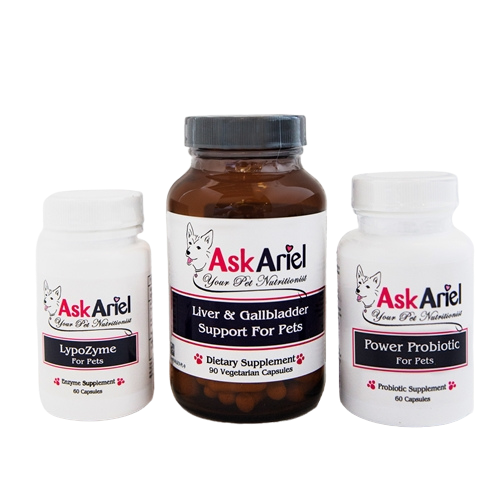
Liver Support Kit - Contains three gentle supplements that work together synergistically to improve digestion of fats and protein, relieve pain and digestive discomfort and reduce ascites (swelling of the abdomen). Helps to optimize liver function while detoxifying from conventional veterinary medications and treatments.
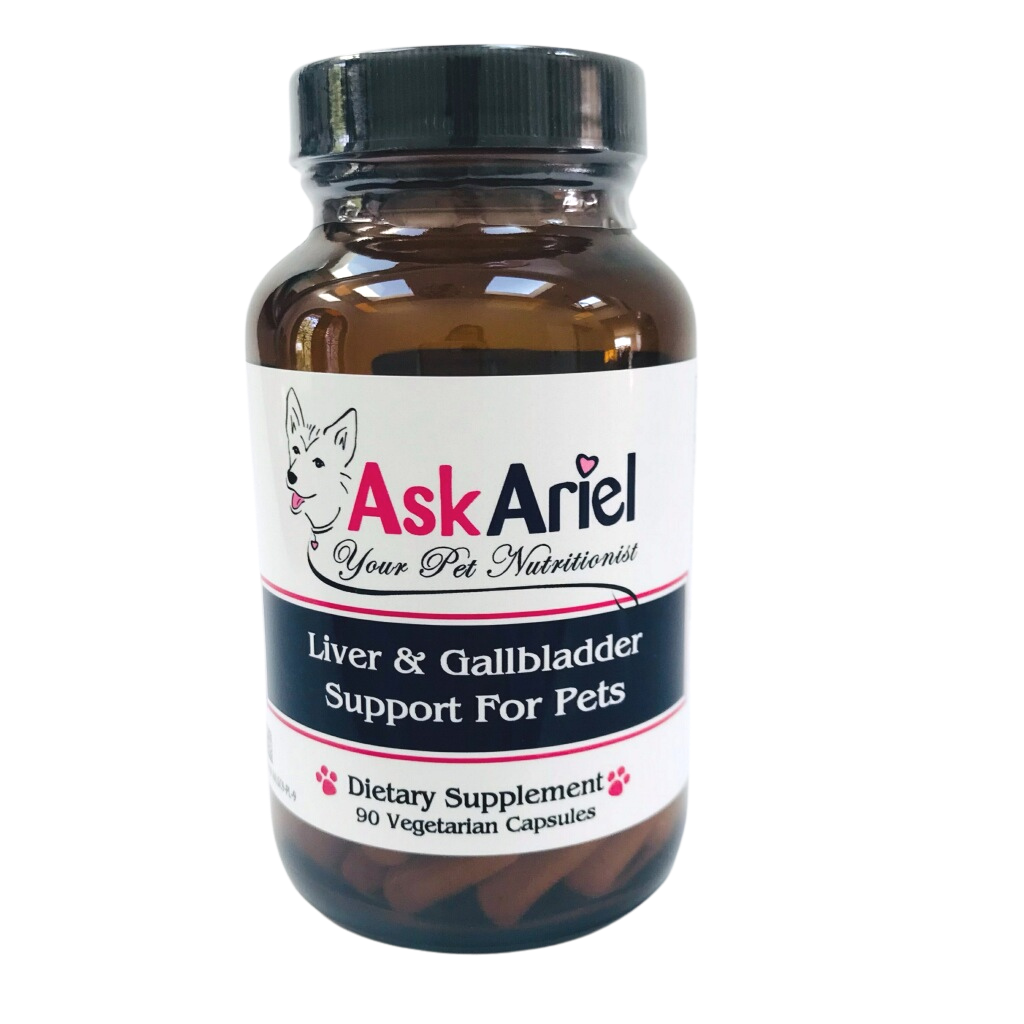
Liver & Gallbladder Support - A broad-spectrum product that is effective for pets with liver cancer. It can help detoxify the liver when you are giving your pet medications, especially NSAIDs given for pain and chemotherapy treatments. It supports bile flow and healthy liver function.
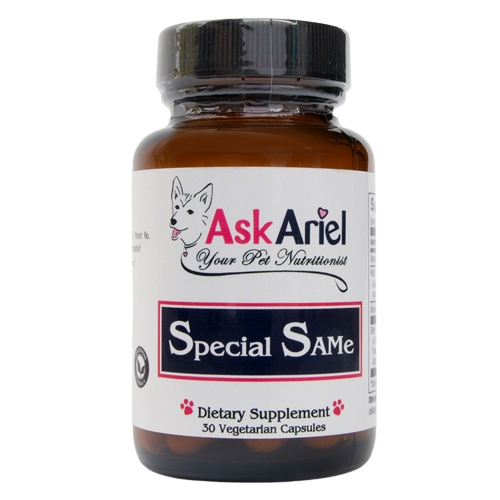
Special SAMe - The single most important supplement to use if your dog needs liver support. Special SAMe supplements metabolic activity, helps maintain glutathione levels (which is known to be protective and detoxifying for the liver) and supports cell regeneration.
.png)
OncoPet Cancer Vitamin - A proprietary blend of herbs and medicinal mushrooms that provide powerful immune support. The natural ingredients in OncoPet contain polyphenols, beta-glucans and antioxidants, like D-fraction and L-ergothioneine, that boost the immune system and help regulate your dog's inflammatory response. OncoPet is a comprehensive dog cancer vitamin that also includes herbs to help balance the gut microbiome and reduce nausea and cancer-related fatigue. Combines well with cancer treatments from your veterinarian or veterinary oncologist.
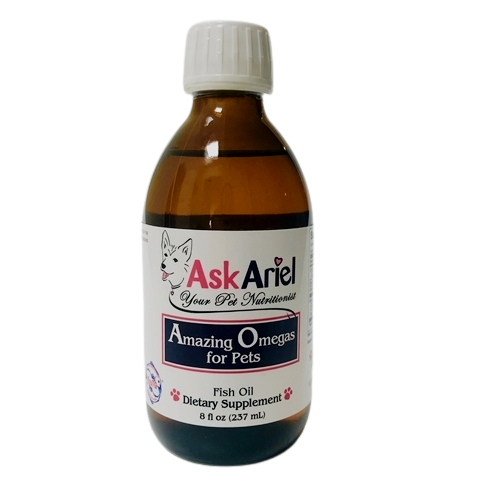
Amazing Omegas - Premium quality, purified fish oil for dogs. It is a powerhouse of omega-3 nutrients (essential fatty acids) that can help your pet fight cancer. Amazing Omegas is a highly purified fish oil made from sardines, anchovies and mackerel, processed with minimal heat to preserve the oil in its natural state. Packed in glass bottles to prevent any chemicals from plastic leaching into the oil. Naturally processed, highly bioavailable with all toxins and heavy metals carefully removed. Compare the nutrient panel of this premium pet fish oil to all other brands and see the difference.
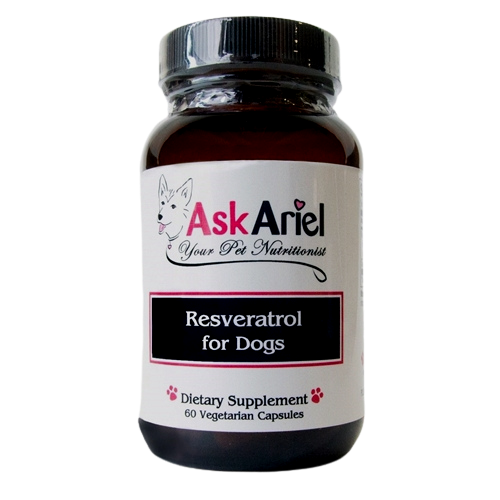 Resveratrol for Dogs - Resveratrol is an exceptional antioxidant backed by research and can help your dog in so many ways. Resveratrol is a cancer support and preventative (use with dog breeds that have a higher incidence of cancer, such as bichon frises, German shepherds, Labradors, golden retrievers, boxers). It acts on the process of carcinogenesis by affecting all three phases - tumor initiation, promotion and progression - and suppresses the final steps of carcinogenesis. Resveratrol is cardio-protective (excellent for breeds prone to heart issues, such as Cavalier King Charles spaniels, poodles, dachshunds). Very important if your pet is undergoing radiation. Energizing, promotes longevity. Excellent for senior dogs. Resveratrol for Dogs also supports immune function. Resveratrol for Dogs - Resveratrol is an exceptional antioxidant backed by research and can help your dog in so many ways. Resveratrol is a cancer support and preventative (use with dog breeds that have a higher incidence of cancer, such as bichon frises, German shepherds, Labradors, golden retrievers, boxers). It acts on the process of carcinogenesis by affecting all three phases - tumor initiation, promotion and progression - and suppresses the final steps of carcinogenesis. Resveratrol is cardio-protective (excellent for breeds prone to heart issues, such as Cavalier King Charles spaniels, poodles, dachshunds). Very important if your pet is undergoing radiation. Energizing, promotes longevity. Excellent for senior dogs. Resveratrol for Dogs also supports immune function.
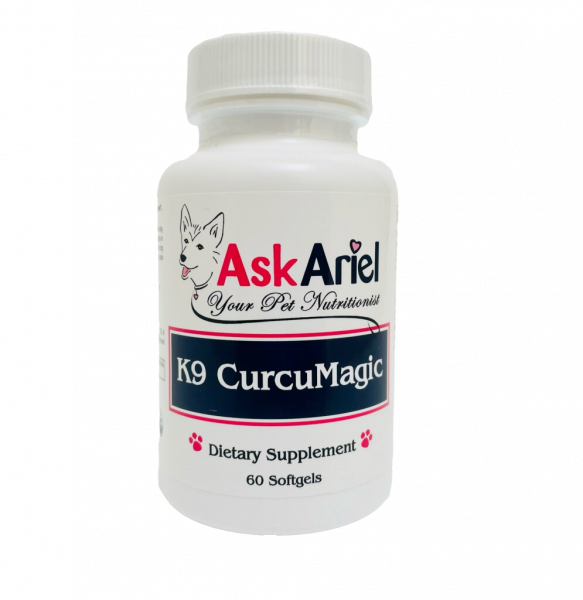
K9 CurcuMagic - A scientifically proven natural anti-inflammatory pet supplement containing a patented combination of three curcuminoids acting as free radical scavengers. These cancer-fighting nutrients help prevent and fight cancer with a unique bioactive turmeric formula. K9 CurcuMagic absorbs best when digested with fat, especially omega-3 fatty acids (Amazing Omegas), which is why our clients use the two pet cancer supplements together. If your pet is undergoing radiation for any type of dog liver cancer, curcumin can protect the skin undergoing radiation.
.png) Immune Harmony - Premium-quality patented blend of plant sterols and antioxidants. When battling with liver cancer, dogs can benefit greatly from this #1 choice for pets with cancer. Unique patented plant sterol supplement tolerated well by even the smallest pets. This pet vitamin has been successfully used in conjunction with chemotherapy and/or prednisone since 2005. The sterols contained in Immune Harmony have been shown in studies to have anti-inflammatory, anti-cancer and immunomodulatory properties. No known toxicity has been found. The antioxidants protect the body from free radical damage, along with an essential fatty acid complex that assists in the bioavailability of these health-promoting nutrients. Excellent value: One bottle lasts between two and four months depending on the weight of your pet. Immune Harmony - Premium-quality patented blend of plant sterols and antioxidants. When battling with liver cancer, dogs can benefit greatly from this #1 choice for pets with cancer. Unique patented plant sterol supplement tolerated well by even the smallest pets. This pet vitamin has been successfully used in conjunction with chemotherapy and/or prednisone since 2005. The sterols contained in Immune Harmony have been shown in studies to have anti-inflammatory, anti-cancer and immunomodulatory properties. No known toxicity has been found. The antioxidants protect the body from free radical damage, along with an essential fatty acid complex that assists in the bioavailability of these health-promoting nutrients. Excellent value: One bottle lasts between two and four months depending on the weight of your pet.
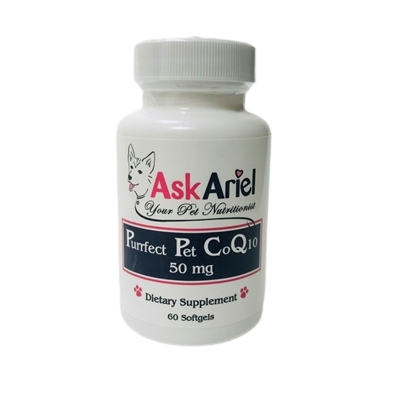
Purrfect Pet CoQ10 is an excellent antioxidant and anti-inflammatory. Kaneka Ubiquinol™ helps to protect cells, tissues and organs from oxidative damage caused by free radicals. Animal studies have found that CoQ10 boosts the immune system and helps the body fight certain infections and types of cancer.
Note: Ask Ariel's holistic supplements for canine liver cancer are recommended by veterinarians nationwide. The supplements have been used successfully to help symptoms of canine liver cancer. Pet Nutritionist Susan Blake Davis offered holistic consultations for pets with cancer at a leading veterinary oncology hospital in Orange County, CA, and at several VCA Hospitals for over 10 years. Her years of experience formulating diet and supplement protocols for dogs with liver cancer are evidenced by the many testimonials on our website. These vitamins can be used in conjunction with the conventional veterinary treatments prescribed by your veterinarian or veterinary oncologist.
Sources
1. Factors Associated With Long-Term Survival In Dogs Undergoing Liver Lobectomy As Treatment For Liver Tumors. Can Vet J. 2015 Jun;56(6):598-604.
2. Massive Hepatocellular Carcinoma In Dogs: 48 Cases (1992-2002). J Am Vet Med Assoc. 2004 Oct 15;225(8):1225-30. doi: 10.2460/javma.2004.225.1225.
3. Impact Of Surgical Margins On Survival Of 37 Dogs With Massive Hepatocellular Carcinoma. N Z Vet J. 2017 Sep;65(5):227-231. doi: 10.1080/00480169.2017.1319304.
4. Risk Factors and Outcome in Dogs With Recurrent Massive Hepatocellular Carcinoma. Veterinary and Comparative Oncology. 29 April 2022 doi.org/10.1111/vco.12824.
|